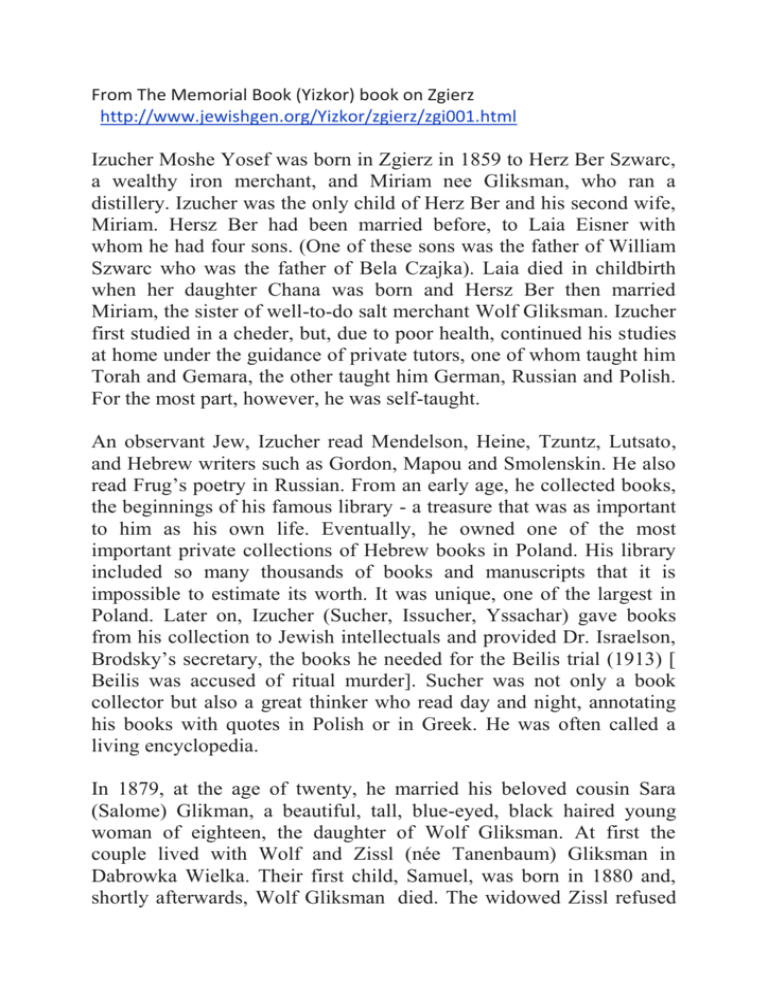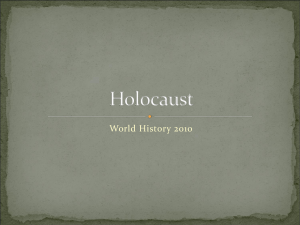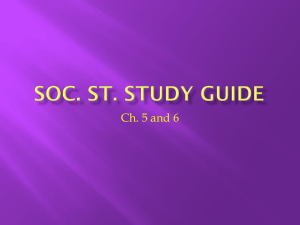After the death of Zissl Gliksman (1998), Sucher`s financial condition
advertisement

From The Memorial Book (Yizkor) book on Zgierz http://www.jewishgen.org/Yizkor/zgierz/zgi001.html Izucher Moshe Yosef was born in Zgierz in 1859 to Herz Ber Szwarc, a wealthy iron merchant, and Miriam nee Gliksman, who ran a distillery. Izucher was the only child of Herz Ber and his second wife, Miriam. Hersz Ber had been married before, to Laia Eisner with whom he had four sons. (One of these sons was the father of William Szwarc who was the father of Bela Czajka). Laia died in childbirth when her daughter Chana was born and Hersz Ber then married Miriam, the sister of well-to-do salt merchant Wolf Gliksman. Izucher first studied in a cheder, but, due to poor health, continued his studies at home under the guidance of private tutors, one of whom taught him Torah and Gemara, the other taught him German, Russian and Polish. For the most part, however, he was self-taught. An observant Jew, Izucher read Mendelson, Heine, Tzuntz, Lutsato, and Hebrew writers such as Gordon, Mapou and Smolenskin. He also read Frug’s poetry in Russian. From an early age, he collected books, the beginnings of his famous library - a treasure that was as important to him as his own life. Eventually, he owned one of the most important private collections of Hebrew books in Poland. His library included so many thousands of books and manuscripts that it is impossible to estimate its worth. It was unique, one of the largest in Poland. Later on, Izucher (Sucher, Issucher, Yssachar) gave books from his collection to Jewish intellectuals and provided Dr. Israelson, Brodsky’s secretary, the books he needed for the Beilis trial (1913) [ Beilis was accused of ritual murder]. Sucher was not only a book collector but also a great thinker who read day and night, annotating his books with quotes in Polish or in Greek. He was often called a living encyclopedia. In 1879, at the age of twenty, he married his beloved cousin Sara (Salome) Glikman, a beautiful, tall, blue-eyed, black haired young woman of eighteen, the daughter of Wolf Gliksman. At first the couple lived with Wolf and Zissl (née Tanenbaum) Gliksman in Dabrowka Wielka. Their first child, Samuel, was born in 1880 and, shortly afterwards, Wolf Gliksman died. The widowed Zissl refused to be separated from her daughter so Yissachar and Salomea continued to live in her home until her death eighteen years later. In the interim, Hersz Ber and Miriam Szwarc both died and left the Zgierz house to Yissachar. This was the house that Hersz Ber had built on the 3rd of May street near the Stary Rynek (Old Markerplace Square). The house was rented out, and the rental income allowed Sucher to provide his children with a good education. The eldest, Samuel, on graduation from high school, was sent to university in Paris to study engineering. Free of financial worries, Sucher dedicated himself to "Tora Va’Avoda" (studying the Torah and living its ideals). In 1892, his 12 year old son, Wolutek, died. Izucher discarded his long coat (kapota), the mark of a religious Jew. While on a visit to St. Petersburg, he had met Jewish scholars and intellectual leaders; he had visited the Imperial library and had made friends with the famous poet, Yehudah Leib Gordon (Yala"g; Leon Gordon). He met the Russian cleric and advisor to Tsar Alexander III, Yohan Kronshtedsky, as well as Eliza Orzeszkowa, a famous Polish writer (nominated in 1905, along with Henryk Synkiewicz and Leo Tolstoy, for the Nobel Prize in Literature – Synkiewicz got it). Izucher never wore a long coat again. After the death of Zissl Gliksman (1998), Sucher’s financial condition deteriorated. Zissl’s eldest son inherited the Dabrowka house so Izucher and Salomea and their growing family moved into the Szwarc house in Zgierz. They needed most of the house for themselves so the rental income dwindled, barely providing for daily needs. Sucher opened a railway factory but it burned down and he lost the little money he had left from his inheritance. He later opened a ‘mercerie’ or ‘galanteria’, on #3 Pilsudski Street (1929 Polish Business Directory – pages 1013-1015 are if Zgierz) Around the turn of the century, a new commercial school accepting Jewish students opened in Zgierz. Many young Jews came to Zgierz from all over Poland and Lithuania and, since they owned a large house with rooms to let, Sucher and Salomea opened a boarding residence for the students. Salomea did most of the work and Sucher was again free to dedicate his time to his books. Eventually, the Russian government moved the school away from Zgierz but, by that time, Samuel had become a mining engineer and was working in Spain and in Africa. He was able not only to support his parents but to pay for the education of his brothers, Szymek, Henryk, Marek, Olek and the weddings of his sisters, Mania, Cesia, and Zosia. Sucher continued to travel and disseminate, in writings and in oral presentations, his plans for a Jewish Renaissance in Poland. In 1911, political Zionist organizations were banned. Meetings could officially include only cultural events. Discussions centred around the promotion of the Hebrew language, assigning greater importance in the press of articles in that language, and the creation of a Hebrew library. Izucher was a maskil, a leader of the Haskalah in Zgierz. Haskalah refers to the Jewish Enlightenment, a movement among European Jews in the 18th–19th centuries that advocated better integration of Jews into European society, increasing education in secular studies, as well as Hebrew language and Jewish history. Leaders of the Haskalah movement were called maskilim and, in Zgierz, they were Izucher Szwarc, Moshel Eiger, and Tuvia Lipschitz. Izucher was a co-founder of the group Chovevy Zion, a member of B’Nei Moshe (established by Echad Ha-Am), and, later, the Union of Zionists. Through the actions of these groups, Zgierz became a pioneering centre of Zionism. In his home, he was host to elite Polish Jewish writers, scientists, social activists, artists. They met every each Shabbat afternoon for scholarly debates. Y.L. Gordon and Nachum Sokolov mention him in their memoirs. He published in the newspaper Ha - Tzefira, and later in Ha - Yom and in various Warsaw and Lodz Jewish newspapers (in Yiddish) under the pseudonym ‘Yam Szachor’ (black sea)[ or Yom Szachor (day of darkness) – no vowels in Hebrew]. Sometimes he used his own name, sometimes ‘Szachor Ve-Tuszija’. He published numerous historical and bibliographic articles in Ha-Szachar, HaMagid, Magid Mishneh and other periodicals; studies on Tverii and its rabbinical leaders in "Ha Menora" of Lodz, and wrote many other articles in the Yiddish press. Izucher combined the characteristics of a religiously faithful Jew of the old school and those of a contemporary activist. Enjoying wide respect, noble, good-natured, he was a man of consequence. He treated everyone with the same courtesy and attention. He was a municipal leader and was in charge of various public institutions. He was the founder of the Jewish People's Bank in Zgierz. In 1926, Izucher went to Johannesburg to visit Szwarc cousins. His letters from Johannesburg addressed to his son-in-law Jehiel Frenkel have been preserved. Salomea died in 1938 after a short illness. Izucher’s eightieth birthday in 1939 was reported in all the Jewish newspaper of Poland. He was elected honorary chairman of the city of Zgierz. Shortly thereafter, at the end of December 1939, the liquidation of Zgierz began. On Tuesday, December 26, the Germans issued an order for all Jews to leave the city. Izucher Szwarc was ‘fortunate.’ He was not to know the torture of exile. He died of a heart attack, clutching the Song of Songs when the Germans marched into his house with the intention of destroying the library the day before the deportation of Jews from Zgierz (December 26 1939; (14 Tevet 5700)). Fellow Jews brought him by a hand wagon to a Jewish grave in the Zgierz cemetery. None of his family or friends could attend his funeral, arranged by the Red Cross. Nothing is left to mark his grave – the Jewish cemetery in Zgierz has been razed.








